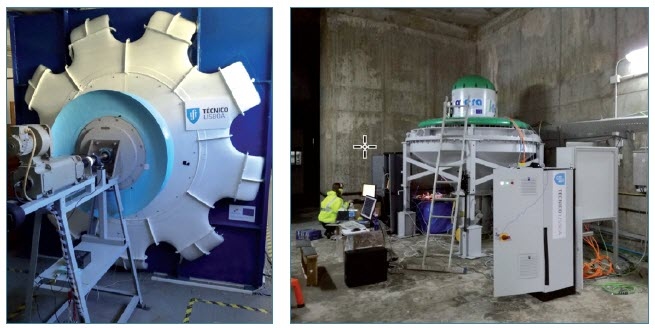PORTUGAL
RESEARCH & DEVELOPMENT
WavEC Offshore Renewables
WavEC is a private non-profit association, currently with 12 associates (private and public), and devoted to the development and promotion of offshore energy utilization thorough technical and strategic support to companies and public bodies. WavEC team is composed by 20 specialists with a broad range of experience on ocean energy, including both the technical (numerical modelling, wave resource, monitoring, technology) and non-technical (economic models, environmental and licensing, public policies, dissemination) issues.
WavEC is a founding member of the European Ocean Energy Association (OEE) and associate member of the European Energy Research Alliance.
WavEC is coordinating the European funded project WETFEET, running since 2015, and has been further involved in a number of R&D projects mainly funded by the European Commission and by the national Foundation for Science and Technology, through the funding programme Oceanera-net.
Three new projects funded by the European Commission programme Horizon2020 were approved by the end of 2017, to start in 2018:
- MEGAROLLER: a 3-year project to develop and demonstrate a Power Take-Off (PTO) for wave energy converters, led by the Finnish developer AW-Energy which has been developing a project in Portugal.
- SEA-TINTAN: a 3-year project to develop and demonstrate a Power Take-Off (PTO) solution based on the existing Wedge Global W200 PTO prototype, led by the Spanish developer Wedge Global.
- DTOceanPlus: a 3-year project led by Tecnalia to develop and demonstrate an open source suite of design tools for the selection, development, deployment and assessment of ocean energy systems (including sub-systems, energy capture devices and arrays).
Instituto Superior Técnico
Two groups were active on ocean energy at Instituto Superior Técnico (IST), University of Lisbon:
- Institute of Mechanical Engineering (IDMEC) with decades-long history in wave energy conversion studies;
- Centre for Marine Technology and Engineering (CENTEC) whose involvement in ocean energy is more recent.
Following previous years, the activity at IDMEC concentrated on wave energy conversion, especially the development of new types of oscillating water column converters (OWCs) and self-rectifying air turbines. An important area of research at IDMEC is latching control of floating and fixed-structure OWC converters, taking advantage of new types of air turbines fitted with fast valves.

Model testing of the twin-rotor air turbine (left) at IST; biradial turbine prototype installed at the OWC-breakwater, Mutriku, Spain (right).
IDMEC/IST is a partner in the WETFEET project (European H2020 programme); in 2017, their involvement concerned mainly the dry-testing of the high-efficiency twin-rotor radial-inflow self-rectifying air turbine at IST. IDMEC/IST is also a partner in the OPERA project (H2020), in which, jointly with the Portuguese company Kymaner, they designed a prototype of the biradial self-rectifying air turbine with a new type of fixed guide vanes and a fast valve. The turbine prototype was supplied by Kymaner, and, after dry-testing at IST, was installed at one of the OWCs of the Mutriku breakwater (Basque Country, Northern Spain), where it has been operating under real sea conditions since June 2017. In 2018, the turbine will be installed on the spar-buoy OWC of the Spanish company Oceantec, for testing at Bimep test site (Northern Spain).
Ocean energy is a major area in the diversified activity of CENTEC/IST. The activities at CENTEC in ocean energy involved a wide range of topics covering waves, tidal currents and offshore wind. The characterization of the wave energy resource (and to a much lesser extent tidal and offshore wind energies) at various oceanic locations in the world has been one of the dominant topics. The study of ocean energy conversion has focused mainly on wave energy converters, with numerical theoretical/modelling and model testing of several types of devices and arrays, and also PTOs (namely hydraulic-circuit PTOs).



